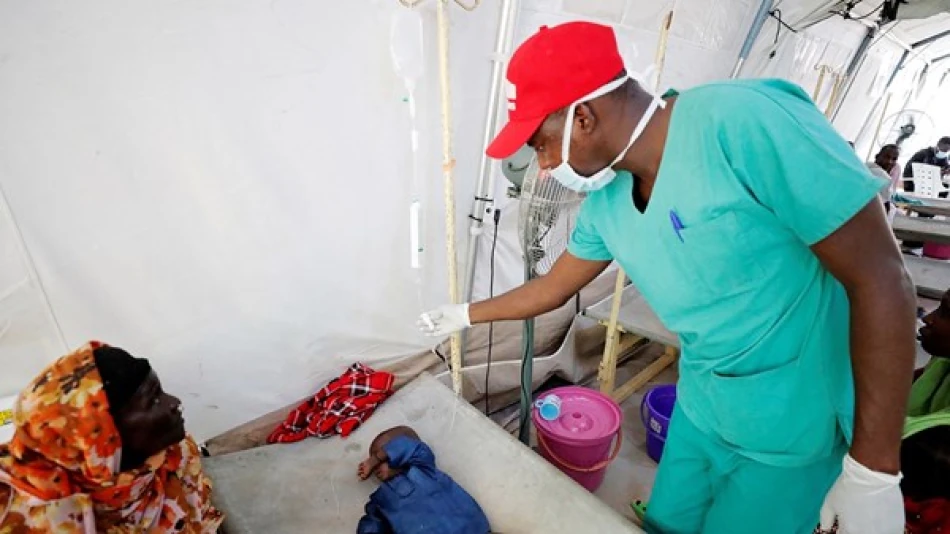
WHO Warns of Severe Global Cholera Outbreak: Stay Informed and Prepared
Global Cholera Crisis Deepens as Death Rates Surge 46% Despite Fewer Cases
The World Health Organization reported Friday that cholera outbreaks are intensifying worldwide, with over 400,000 cases recorded across 31 countries this year. While total infections dropped 20% compared to last year, deaths have surged by 46%, signaling a dangerous deterioration in treatment access and healthcare infrastructure in affected regions.
A Tale of Two Trends: Fewer Cases, More Deaths
The WHO's latest data reveals a troubling paradox in the global cholera landscape. From January through August 17, the organization documented 409,222 cases and 4,738 deaths worldwide. The 20% decline in infections suggests some progress in prevention efforts, but the dramatic spike in mortality rates tells a darker story about healthcare system failures.
Six countries now report death rates exceeding 1%, with two nations posting alarming fatality rates of 7.7% and 6.8% respectively. These figures expose critical gaps in case management and delayed access to care, according to WHO officials.
The Perfect Storm: Conflict, Climate, and Displacement
Multiple Crisis Drivers
The WHO attributes the worsening situation to an interconnected web of global challenges. Armed conflicts, mass displacement, natural disasters, and climate change have created ideal conditions for cholera transmission, particularly in rural areas and flood-affected regions where weak infrastructure limits healthcare access.
This pattern mirrors historical cholera outbreaks that have consistently followed humanitarian crises. The current surge recalls the post-earthquake cholera epidemic in Haiti (2010-2019), which killed nearly 10,000 people, and ongoing outbreaks in conflict zones like Yemen and South Sudan.
Geographic Spread and Vulnerability
Perhaps most concerning is cholera's reappearance in countries that hadn't reported significant case numbers for years. This geographic expansion suggests the disease is exploiting new vulnerabilities created by recent global disruptions, from the COVID-19 pandemic's healthcare system strain to increasing climate-related disasters.
The Treatment Paradox: Simple Disease, Complex Challenges
Cholera remains one of medicine's most treatable diseases when caught early. The bacterial infection, caused by consuming contaminated water or food, typically presents as severe diarrhea and can be effectively managed through oral rehydration therapy and basic medical care. Yet patients can die within hours without prompt treatment.
This simplicity makes the current death rate surge particularly troubling. It suggests that even basic healthcare interventions are failing to reach affected populations in time, pointing to broader systemic failures rather than medical limitations.
Global Health Security Implications
The WHO warns that given the "scale, severity, and interconnected nature of these outbreaks, the risk of further spread within and between countries is extremely high." This assessment carries significant implications for international travel, trade, and regional stability.
Unlike previous cholera waves that remained largely contained to specific regions, today's outbreaks occur against a backdrop of increased global mobility and interconnectedness. The disease's reemergence in previously unaffected areas suggests traditional containment strategies may prove insufficient.
Looking Ahead: Prevention vs. Response
The current crisis highlights a fundamental challenge in global health: the tension between emergency response and long-term prevention. While immediate interventions can save lives, the underlying drivers—poverty, conflict, and climate change—require sustained international cooperation and investment.
The WHO's latest report serves as both a warning and a call to action. Without addressing the root causes enabling cholera's spread, the international community may face recurring outbreaks that strain already fragile healthcare systems and threaten regional stability. The question isn't whether cholera will continue spreading, but whether global leaders will mobilize resources to address both the immediate crisis and its underlying causes.
Most Viewed News

 Layla Al Mansoori
Layla Al Mansoori






